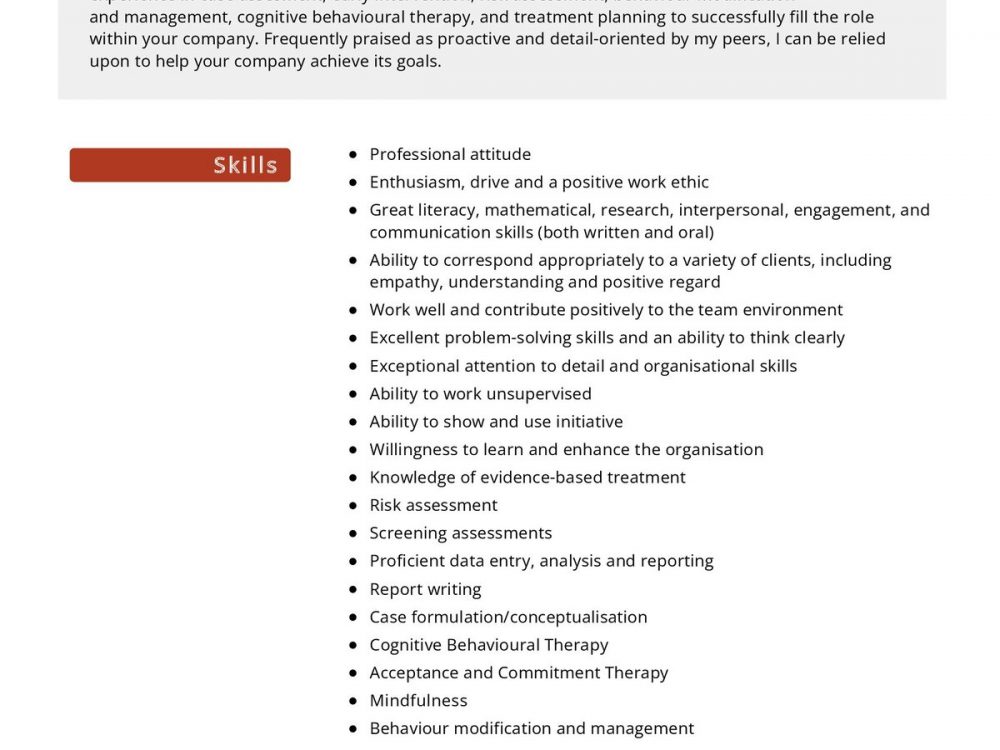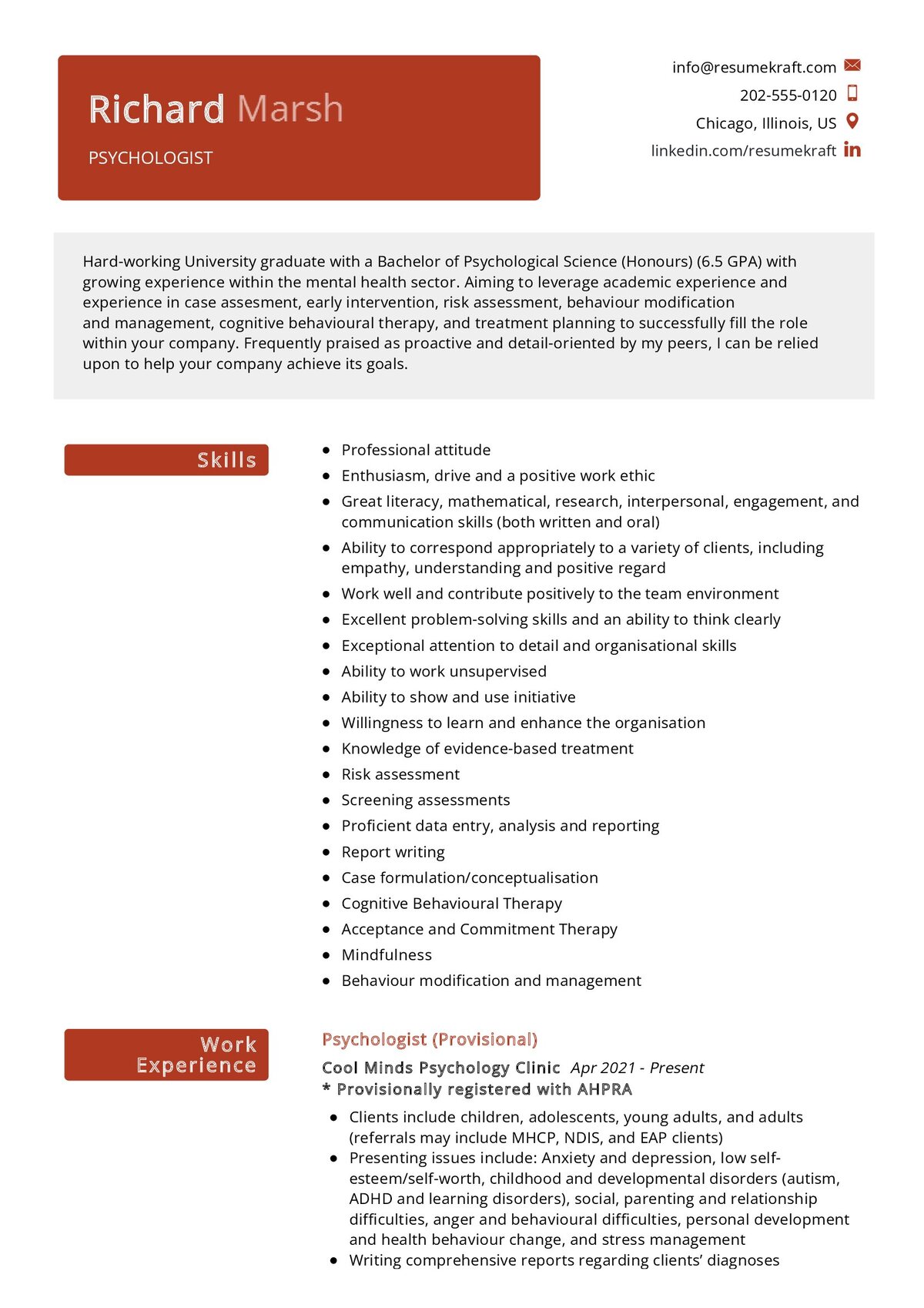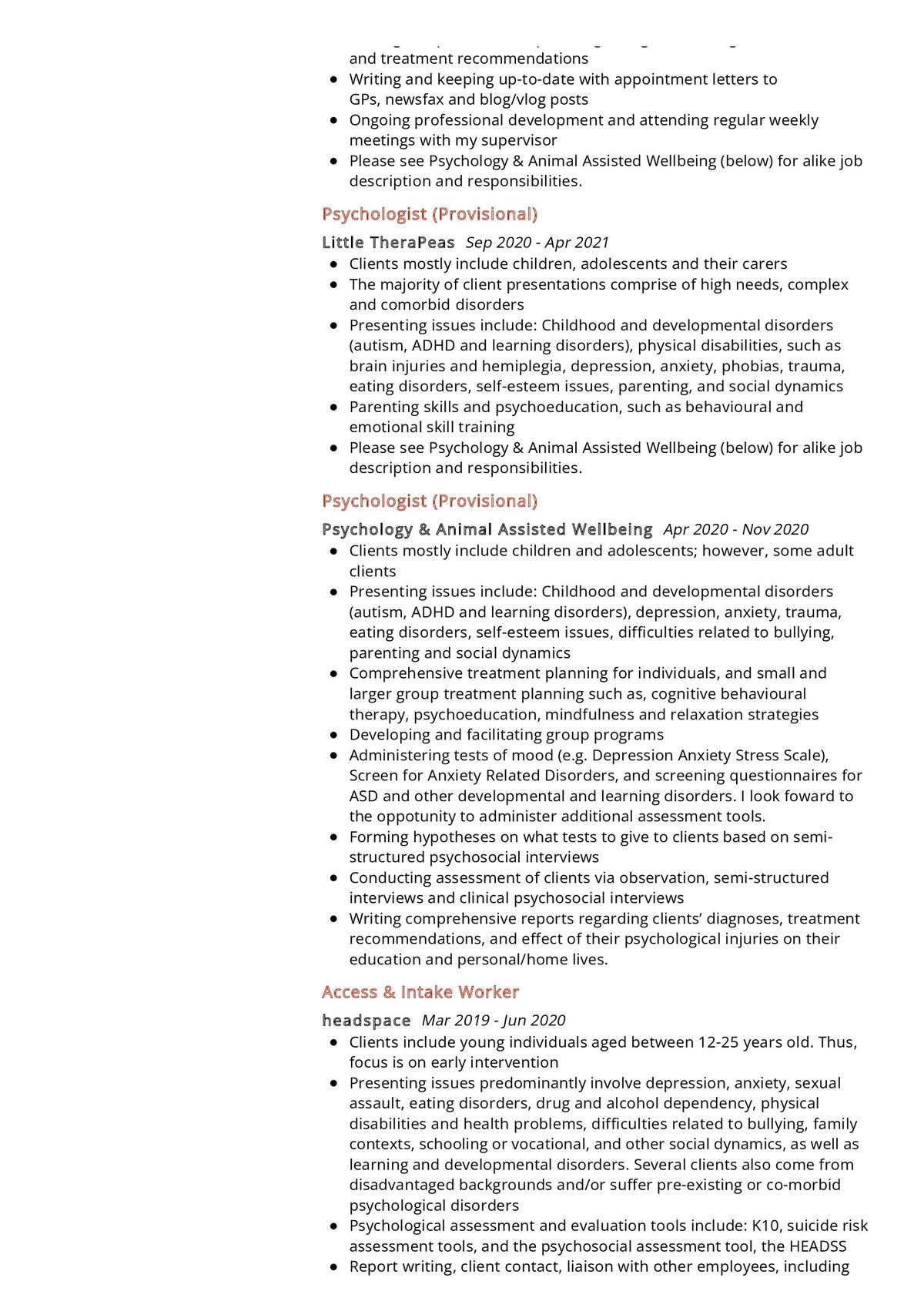What Should Be Included In A Psychologist Resume?
Writing a resume as a psychologist is a unique challenge, and it is important to ensure that all relevant information is included. A psychologist’s resume should provide an overview of the individual’s education, professional experience, and skills. Potential employers need to know what makes the psychologist stand out from other candidates and the value they can bring to the workplace.
Most resumes should start off with the applicant’s name, contact information, and a professional summary. This is a brief introduction that highlights the individual’s qualifications, experience, and qualifications. It should provide potential employers with an understanding of the psychologist’s professional background and the specific qualifications that make them the best candidate for the position.
After the professional summary, the resume should include a list of educational qualifications. This should include any degrees or certificates the individual has earned, such as a PhD in psychology or a master’s degree in counseling. It is also important to list any specialized training or certifications that are relevant to the position.
In addition to educational credentials, the resume should also include a list of professional experience. This should include any relevant internships, part-time or full-time jobs, and volunteer work. It is important to include details such as the organization or employer, the job title, and the dates of employment. This section should also include a brief description of the tasks and responsibilities the individual had during each position.
Finally, the resume should include a section listing the psychologist’s skills and qualifications. This should include any specialized skills and expertise that the individual has acquired. It is important to list any areas of expertise that are particularly relevant to the position, such as experience with psychotherapy, psychological testing, or crisis intervention . Additionally, the psychologist should list any awards or recognitions they have received, such as an honors thesis or professional recognition. It is also important to include any professional memberships or certifications, such as membership in the American Psychological Association or certification as a Health Service Psychologist.
What Skills Should I Put On My Resume For Psychologist?
When it comes to applying for a job as a psychologist, having the right skills is essential. You need to be able to think critically, interpret data, and empathize with patients. It’s also important to craft a resume that reflects these skills. When it comes to writing a psychologist resume, there are certain skills you should emphasize in order to stand out.
Interpersonal skills are a must-have for any psychologist. You need to be able to understand people, to be able to work with them and to be able to provide solutions that are tailored to individual needs. Communication skills are critical; you need to be able to explain complex mental health issues to patients in a way that is both compassionate and clear. Being able to work with diverse individuals is also important, as well as being able to demonstrate patience, empathy, and understanding.
Research skills are also important for psychologists. You need to be able to find and interpret relevant data and to use it to develop meaningful solutions. You should also be able to identify trends and patterns in order to help clients better understand their mental health.
Organizational skills are also essential for psychologists. You need to be able to stay organized and to keep track of patient information and progress. This includes being able to prioritize tasks, manage time efficiently, and keep detailed records.
Finally, computer skills are essential for psychologists. You need to be able to use software programs such as Microsoft Office, and to be comfortable with electronic health records.
By including these skills in your resume, you can show potential employers that you have the necessary qualifications for the job . Being able to demonstrate these skills can help you stand out from other applicants and make you an attractive candidate for the position.
What Is The Job Description Of The Psychologist?
A psychologist is a professional who specializes in understanding the science of human behavior and mental processes. They help people by providing counseling and therapy services, as well as psychological testing and assessment. Psychologists also often provide research and teaching services in academic settings.
The job description of a psychologist includes providing individuals, couples, families and groups counseling services. Psychologists must be able to maintain professional relationships with their clients, as well as their colleagues in the profession. They must also keep informed about the most recent research and theories in the field.
Psychologists must also be able to assess a person’s mental and emotional state, in order to determine what type of treatment would be most effective. They must be able to evaluate a person’s behavior, thoughts and feelings, as well as their physical and social environment. Additionally, they must be able to interpret the results of psychological tests and assessments.
In order to become a psychologist, individuals must typically obtain a doctoral degree in Psychology. Many states also require that psychologists obtain a license in order to practice. Additionally, psychologists must also stay informed about the latest developments and research in the field.
By obtaining a doctorate degree, psychologists can also teach at the college or university level, conduct research, or work as a consultant in the private or public sector. In addition, some psychologists may specialize in particular areas such as clinical psychology, psychology education, or counseling psychology.
What Is A Good Objective For A Psychologist Resume?
When it comes to writing your psychologist resume, there is no one-size-fits-all approach. However, there are certain elements that should be included in order to make sure your resume stands out from the competition. One of the most important elements of your resume is the objective.
Your objective should succinctly communicate your specific interests and goals as a psychologist. This statement should be short and to the point, but should still give the reader a good idea of why you are the perfect candidate for the job. For example, you might include something like, “Seeking a position as a clinical psychologist where I can utilize my experience in psychotherapy, assessment, and diagnosis to help my clients.” This objective statement clearly conveys what you are looking for, and the skills and experience you can bring to the table.
When crafting your objective, it’s important to tailor it to the specific position you are applying for. Make sure to include any relevant experience or credentials that you possess and can bring to the table. Additionally, you should avoid using generic language and instead focus on the job requirements and how you uniquely meet them.
A well-crafted objective can be the difference between your resume being read and your resume being ignored. So make sure to put in the effort to craft a statement that will make you stand out from the crowd.
What Are The Career Prospects In The Psychologist?
The career prospects for psychologists are promising. As the demand for mental health services increases, so does the need for qualified psychologists. Psychologists are in high demand in many areas, such as clinical psychology, counseling, education, research, and organizational psychology.
The job outlook for psychologists is expected to grow 12 percent from 2019 to 2029, according to the U.S. Bureau of Labor Statistics (BLS). This is much faster than average growth for all occupations. The median annual salary for psychologists was $80,370 in 2019, according to the BLS.
Clinical psychologists often work in private practices, hospitals, clinics, and other mental health facilities. They focus on diagnosing, treating, and preventing mental health disorders. Counseling psychologists provide psychotherapy and other forms of counseling to individuals, couples, families, and groups. They also do research and teaching.
Educational psychologists are typically employed in universities, colleges, and other educational institutions. They design and deliver training programs, research methods and methods of teaching, and provide counseling and mentoring services to students.
Research psychologists work in research settings, such as universities, government, research institutes, and industry. They focus on exploring and evaluating the effects of social, biological, and psychological factors on human behavior.
Organizational psychologists work with private businesses and government agencies to improve organizational effectiveness and productivity. They focus on developing and implementing training programs, assessing work environments, and studying team dynamics.
Overall, psychologists play a vital role in improving mental health and well-being. Those who choose to pursue a career in the field can expect to find opportunities in a variety of settings.
Key Takeaways for an Psychologist resume
- When it comes to writing an effective Psychologist resume, there are key takeaways that any job seeker should be aware of. A strong resume should highlight your qualifications, experience, and skills that make you well-suited for the role you are applying for. Your resume should be tailored to each specific role, as well as to the industry you are applying to.
- The most important takeaway when creating a Psychologist resume is to showcase your professional experiences, accomplishments, and qualifications. Be sure to include any relevant experience, such as working with clients, conducting studies, and research. Additionally, highlight any specific specializations or certifications you may have. Be sure to emphasize any awards, certifications, or honors that may be relevant to the role.
- In addition to showcasing your professional experience, it is important to include soft skills that will set you apart from other candidates. When writing your Psychologist resume, be sure to emphasize qualities such as active listening, empathy, problem-solving, and communication skills. These skills will demonstrate your ability to work with clients and create a positive therapeutic relationship
- When writing your Psychologist resume, it’s important to show off your communication and interpersonal skills in your resume. It is important to demonstrate the ability to work with clients and provide support. Additionally, it is important to show off your problem-solving and analytical skills. Your resume should provide an employer with an overview of how you could potentially benefit their team.
- Finally, make sure that your resume is well-organized and visually appealing. It should be easy to read, with clear headings and bullet points. Additionally, it should be formatted in a way that is easy for a reader to follow and understand. This will help your resume stand out from the competition.
By following these key takeaways, you will be able to create a strong Psychologist resume that will help get you noticed by potential employers. Be sure to showcase your qualifications and experiences, highlight your communication and interpersonal skills, and create an overall visually appealing document



